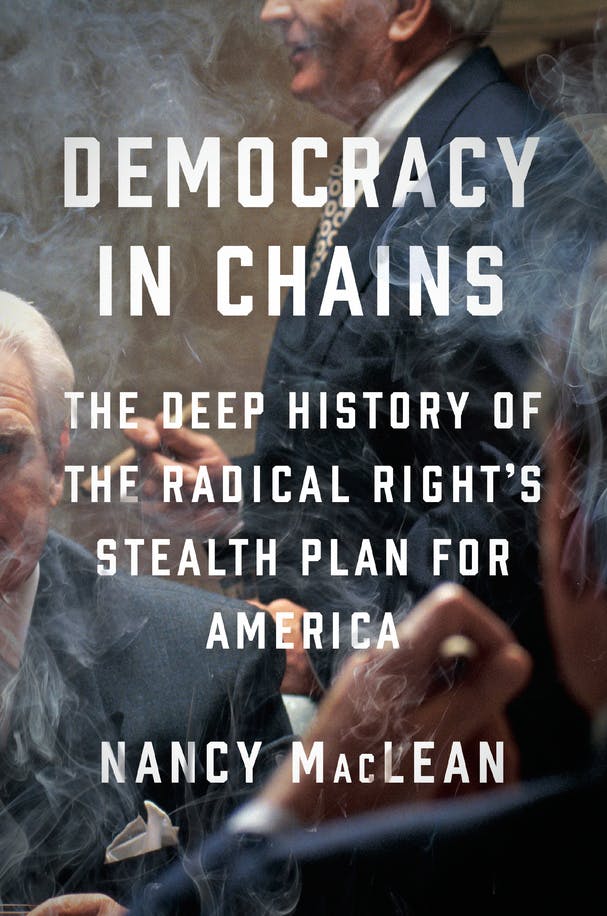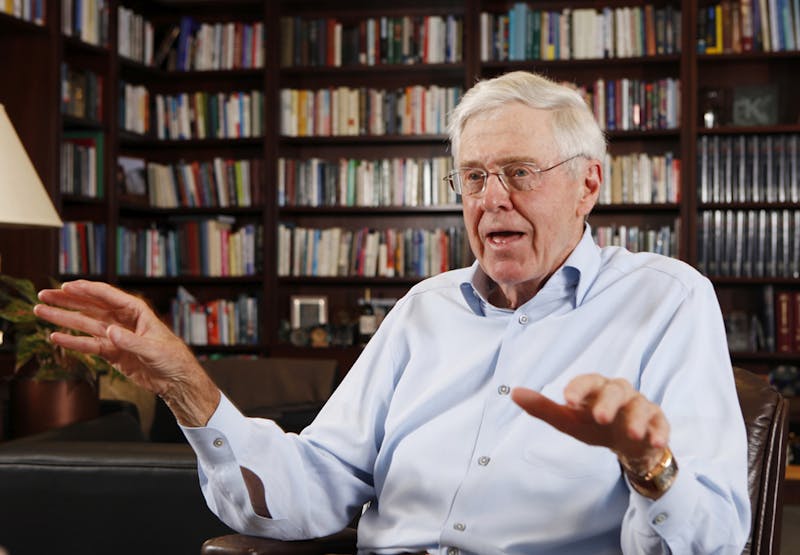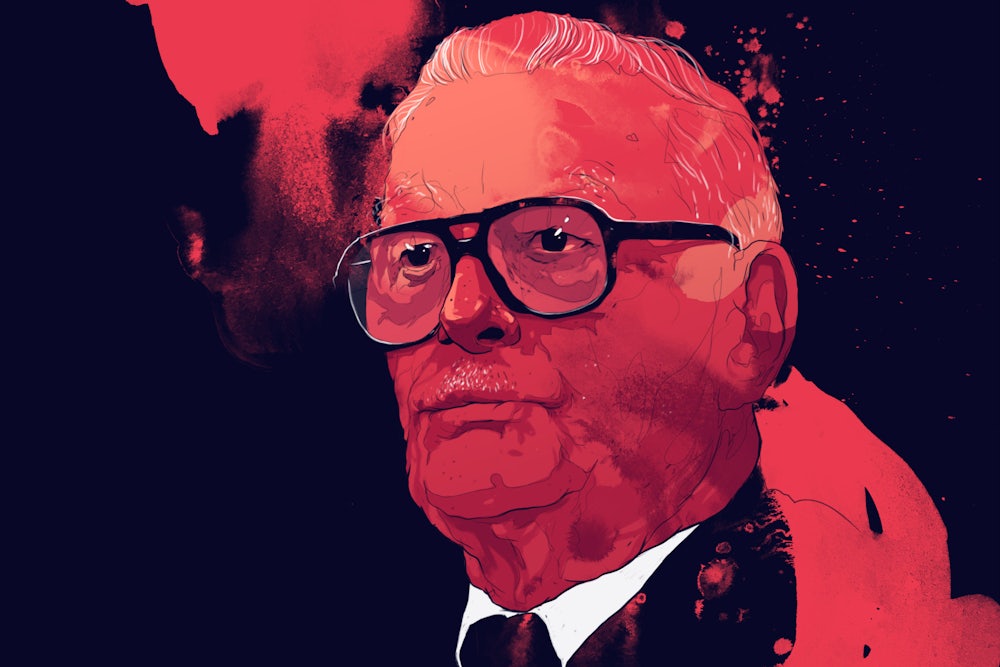We all know we live in a democracy. And we all know that in our democracy, inequality is rampant. So the question naturally arises: How do wealthy and powerful people protect their privileges against all those who have the right to vote and might—you never know—reject what the wealthy and powerful want?
According to Nancy MacLean, who teaches history at Duke University, elites have found a better way to serve their cause than the outright reliance on police terror associated with dictators such as Robert Mugabe of Zimbabwe or Rodrigo Duterte of the Philippines. Dictatorships, after all, are unstable. A government powerful enough to terrorize the oppressed could at some point turn around and terrorize the oppressors.
Privileged Americans prefer a safer method, one steeped in our history, and in particular the history of the Southern states: Simply prevent those at the bottom from exercising their right to vote at all. Restricting the franchise remains popular in places like North Carolina and Texas, and has recently moved north into Wisconsin, where new voter ID laws meant that by the 2016 election, 300,000 registered voters found themselves without the identification required to cast a ballot. But while voter suppression offers many advantages to elites, it is far from foolproof. We still have courts, and many of them look askance on such schemes. Administrations can respond by appointing a raft of new judges, as the Republicans have tried to do, but that requires continuous occupation of the presidency, which the Republicans have not (yet) been able to accomplish.

Here is where the economist James McGill Buchanan made his major contribution to American political life. As MacLean tells us in Democracy in Chains, Buchanan, a Tennessean who spent most of his career in Virginia, came up with a way to prevent challenges to elite rule so innovative that it deserved a prize. As it happens, he got one: the Nobel Prize in economics in 1986. Buchanan is known for his contributions to what is called public choice theory, which applies economic reasoning to problems traditionally studied by political scientists. The key insight of public choice theory is that there is no such thing as a disinterested public bureaucracy that carries out neutral policies devoted to the common good. “Each participant in the political process,” Buchanan believed, “tries, single-mindedly, to further his own interest, at the expense of others if this is necessary.” Bureaucrats will inevitably try to expand the scope of what they regulate, just as businessmen will seek to expand their profits. Legislators find themselves at the mercy of government administrators because the administrators tend to have only one interest—protecting their turf—while elected representatives have many.
Following this logic, public choice theorists treat government itself with skepticism. If you start hearing terms such as “government failure” or “rent-seeking behavior,” you are likely listening to a public choice theorist. Rent-seeking occurs when individuals or groups seek to obtain favors from government that only benefit themselves, while all taxpayers pay for it. Agricultural price supports are a typical example; so are licensing laws that make it difficult for a funeral director or barber to set up shops that would compete with existing ones. Government failure simply means that an outcome that could be produced more cheaply and efficiently by the market is instead produced by government at greater cost and inefficiency.
The importance of public choice theory, however, lies not in its technical terminology, but in its overall impact as a way of thinking about government. Over the past few decades, disdain toward government has become an established feature of the American political system. By building an influential base of support among academics for curbing the power of the government, Buchanan made a significant contribution to this change in the national mood. And since government has often acted, at least since the New Deal, to protect those with little power from those with more, public choice theory has helped along the process by which inequality in America has risen so dramatically in recent years.
Buchanan, as it happens, was the grandson of a populist leader and former governor of Tennessee. He grew up, as many populists do, full of resentment—in his case, that of a white Southerner who feels he is not taken seriously by the Ivy League crowd of upper-class Brahmins who look down on people like him as rednecks and hicks. In 1946, after graduating from Middle Tennessee State and doing military service in New York, where he once again felt the sting of discrimination, Buchanan entered the graduate economics program at the University of Chicago. There, he was mentored by Frank H. Knight, one of the era’s most prominent economists, who dominated the department in the 1940s.
Knight’s major contribution was to differentiate between situations of risk, where an outcome can be estimated by probability analysis, and situations of uncertainty, where decisions have to be made with no reliable way to predict their ultimate effect. Knight was an idiosyncratic thinker and anything but an ideologue. But the idea that some things are unknowable led more dogmatic libertarians to the conclusion that markets work better than states, because the state tries to eliminate uncertainty, which can never be done, while the market simply lives with it and adjusts as conditions change.
Knight’s legacy can be seen in the way that later Chicago economists, such as Milton Friedman and Friedrich Hayek, preferred to rely on the market to solve any kind of economic (or social or political) problem and to avoid involving the state wherever possible. Since markets themselves favor those powerful enough to control them, libertarianism holds promise for those who want to limit the reach of democracy: An “invisible hand” unseen by the powerless but nonetheless manipulated by the powerful can nearly always be relied upon to keep people in their place.
Not needing the state, libertarians never developed a theory of it. They simply aim to ensure that some take more advantage than others of the rules that govern a market-driven society. Buchanan, however, refused to view the state as a black box uninteresting in itself: He asked where the rules come from in the first place, and how they could be reshaped according to libertarian principles.
In The Calculus of Consent, the book he co-authored with Gordon Tullock, Buchanan outlined his thinking:
Our approach is based on the idea that, insofar as this pursuit of self-interest does take place, it should be taken into account in the organization of the political constitution. Only in this way can the institutional setting for collective choice-making be constructed so as to confine the exploitation of man by man within acceptable limits. We are convinced that man can organize his political society better by putting checkreins on his behavior in advance, checkreins which effectively restrain the behavior of the deviant from the “moral way.”
In other words, if we come to agreements about the way things should be, but know that some people may not act accordingly, we can anticipate the problem by making rules—“checkreins”—under which such actions would not be possible.
It sounds reasonable enough: One could read Buchanan and Tullock’s book as an argument for checking immoral behavior such as stealing or cheating. But anyone versed in the language of conservative economics will understand immediately that the “deviant” behavior that Buchanan and Tullock wish to curtail consists of any effort by the majority to place restraints on the activities of the rich and powerful, for instance through antitrust laws or environmental regulations. The checkreins Buchanan and Tullock refer to would be embedded in a constitution designed to prevent precisely such action. Think of it this way: If I sue a large firm, I have a chance of winning. If it is unconstitutional for me to sue that firm, I can never win unless the Constitution is amended. Without severe constitutional checks, Buchanan argued, the government will expand so extensively that key individual rights, especially the right to property, will be destroyed; that is why he believed we must fear what he called “constitutional anarchy,” in which “individual rights are subject to the whims of politicians.”
Proudhon, much admired by Karl Marx, famously wrote that property is theft. Using economic models, Buchanan turned the formulation around: The regulation of property is theft. Free-market capitalism will be best protected not by locking the barn door after the horse has been stolen, but by making it extremely difficult to steal the horse in the first place. Think of the stable as secured by a gate to which only the owner has the key. That, Buchanan thought, is what is necessary to preserve capitalism.
Despite Buchanan’s Nobel Prize, it was far from certain that his work would become widely known. Following stints at UCLA and the University of Virginia, Buchanan taught at both Virginia Tech and George Mason University, neither an elite institution. Unlike the 2015 Nobel winner in economics, Angus Deaton, he is not known for his facility with massive data sets; in fact, as MacLean emphasizes, Buchanan used no data at all, relying instead on abstract reasoning. No best-selling book like Milton and Rose Friedman’s Capitalism and Freedom ever graced his résumé. It is true that, like Milton Friedman, Buchanan shared his ideas with the Pinochet dictatorship in Chile. During a week there in 1980, Buchanan made recommendations on the drafting of a new constitution, which severely constrained the power of the majority. But, unlike Friedman, Buchanan “was content,” Maclean writes, “to work in the shadows.” After presenting a paper on democracy to the Mont Pelerin Society in 1981, he never publicly commented on the Pinochet regime again.

One thing, however, did grant Buchanan an unusual degree of influence, according to MacLean, and that was the relationship he created with the Koch brothers, especially Charles Koch, in the 1980s. MacLean suggests that Koch “came to see, perhaps in the light of all the Nobel attention,” that Buchanan “possessed the key he had been searching for over so many years.” Koch was frustrated by Republican administrations’ failure to radically shrink the federal government, and he had begun to view some of the leading libertarians of the time as too woolly-headed to produce fundamental change in Washington. From his perch at George Mason, Buchanan was not only close to Washington geographically, he had also built an impressive academic reputation. Why not give him a try?
With a $10 million gift to George Mason in 1997, Koch helped fund what is now the Center for Study of Public Choice, with Buchanan as director. The Kochs also funded the Institute for Humane Studies and the Center for the Study of Market Processes, which later became the Mercatus (Latin for “market”) Center. The question that both Koch and Buchanan faced was this: Would Buchanan just become one more theoretical economist, or would he use his academic credibility to change public policy directly in the direction Koch favored?
The most fascinating section of MacLean’s book is her account of how Buchanan, with all his wisdom about setting rules, was outmaneuvered at George Mason by an otherwise obscure individual (but with close ties to Koch) named, of all things, Richie Fink. Fink worked hand in glove with Charles Koch to transform the centers at George Mason into think tanks for the New Right. He moved some of them even closer to Washington in Arlington, Virginia—home of the newly named Antonin Scalia Law School—and emphasized how, just like the law school, they could merge movement activities with academic respectability. As if suddenly waking from a nightmare, Buchanan looked around and did not like what Fink was doing, which, in his opinion, “verges on fraud.” Buchanan, it seemed, was primarily a theorist after all.
Buchanan’s concerns were seconded by a colleague, Charles K. Rowley. Neither, however, had much impact. George Mason’s leaders were uninterested in Buchanan’s sudden concern with academic integrity; the Kochs were giving too much money to Fink’s operations, and they knew where their bread was buttered. There now exists in the United States, especially in fields such as economics and law, an entire alternative university system. And thanks in no small part to Buchanan, George Mason is at its center. With plentiful Koch money to spend, this alternative system has fellowships to offer, journals in which to publish, and access to the right kinds of politicians. Think tanks are the nerve centers of this world, and for the past three decades they have relentlessly promoted its messages among staff members in Republican administrations, judges at all levels, and the general public through op eds and television appearances.
Besides, by the time Fink supplanted Buchanan, a new generation had emerged. The Mercatus Center, which MacLean describes as “the base camp” of Koch’s cause at George Mason, is now headed by Tyler Cowen, a well-known blogger and New York Times contributor. MacLean treats Cowen as a typical right-wing libertarian, struggling to make acceptable to the masses policies that benefit only the rich. Here I think she is off base; I admire Cowen’s breadth and refreshing sense of humor. And because there is nothing stealth about him, nor much that is dour and full of resentment, I consider him a far cry from James Buchanan.
Is Buchanan of sufficient importance to sustain a narrative viewing him as the leader of a covert plan to transform America? MacLean describes how she found Buchanan’s papers and personal effects as if she had suddenly stumbled upon a gold mine. She concluded that it was her job to tell “the utterly chilling story of the single most powerful and least understood threat to democracy today: a stealth bid to reverse-engineer all of America, at both the state and national level, back to the political economy and oligarchic governance of mid-century Virginia, minus the segregation.” A tall order, no doubt—and far too tall. At times, MacLean sounds like the British writers who filled in the details of the lives of the Cambridge spies in elaborately plotted novels. She all but announces herself as a solitary truth-teller. If Buchanan and his friends want to change America, she argues, “they should do it honestly and openly.”
The trouble is that they did—and they still do. Buchanan, after all, won a Nobel Prize, which is not generally awarded to scholars who refuse to publish. I was introduced to his ideas in graduate school and have, from time to time, written about them. MacLean’s book, if anything, proves the opposite of what she claims. As she correctly notes, Buchanan’s ideas bear a certain resemblance to those of John C. Calhoun, who himself was anything but obscure, having served as vice president of the United States, and will remain an important historical figure after every university building named after him has been demolished. It also strikes me as a hitch in MacLean’s argument that Charles Koch, this financier of a hidden effort to change America, has been the subject of endless books, blogs, and even films.
MacLean has nonetheless written a book that deserves attention. She is also, in my opinion, very much correct to conclude that this version of libertarianism “actually wants a very strong government”—since any government that seeks to protect the few from the many, at least in a democracy, will require strong public authority to keep the majority in their place. There can be little doubt that the Republican Party’s efforts to restrict the franchise in the name of liberty will continue. Conservatives will go on arguing that the attempts of right-wing religious organizations to discriminate against LGBT people are justified on the grounds of religious freedom. No matter how massive corporate spending on elections becomes, it will still be called free speech. All of these examples of Humpty Dumptyism can be traced back to thinkers like Buchanan, who desired nothing less than to change the rules of our democracy. Democracy in Chains offers an essential guide to this strain of thought and the damage it has done.
